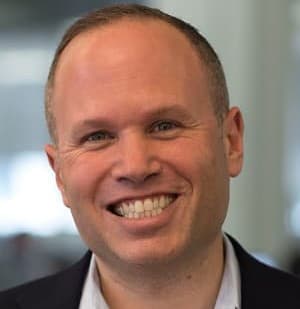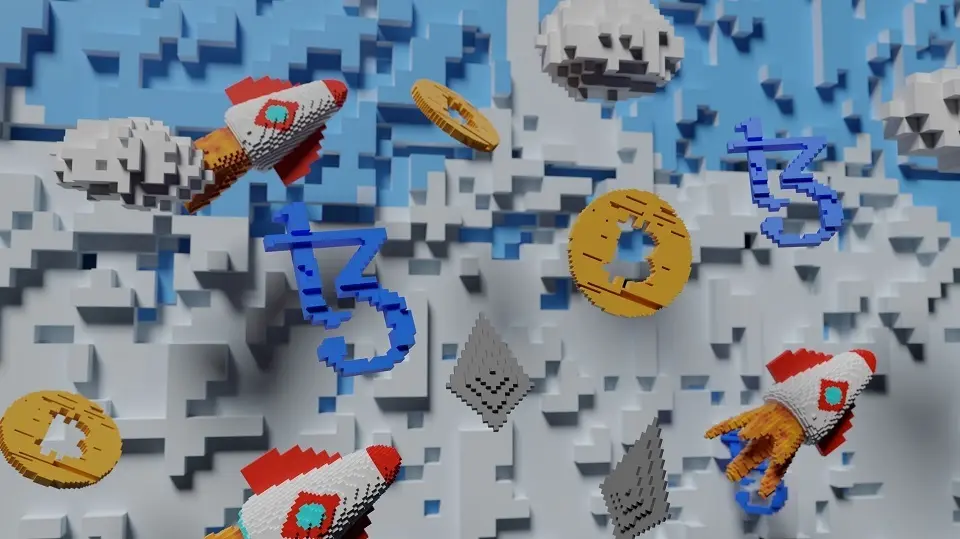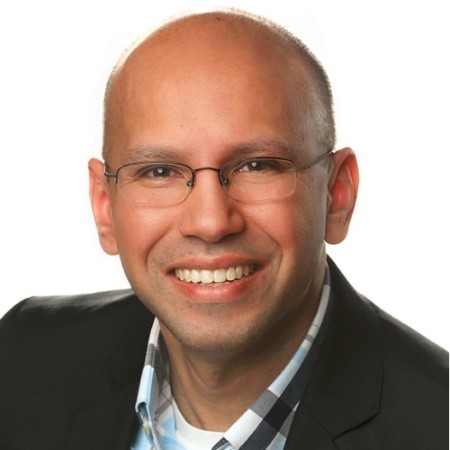Can Web 3.0 transform the financial services industry?
There is a lot of hype around web 3.0.
Depending on who you ask, some believe that smart contracts will bring in a new era of financial self-empowerment. Others think that peer to peer transactions will do away with banks. And the true die hard fans believe that blockchain will provide a better collective governance.
It’s no wonder that companies (both large and small) are racing to invest in this new technology. Each one of them is trying to disrupt traditional business models and usher in a new way of working, thinking, and identifying ourselves.
But how much of this is fact vs. fiction?
To help us make sense of web 3.0, it’s promises / challenges, and real products (not hype) that are being built, I interviewed Robert Krugman, Chief Digital Officer at Broadridge.

Rob has over 25 years of experience, with creating new companies, innovating new solutions and defining business models that enable organizations to get the most out of emerging digital technologies.
He is currently the Chief Digital Officer for Broadridge, where he is responsible for digital strategy and innovation.
As part of his digital strategy, web 3.0 is a major focus area. And where the teams are building several web 3.0 products, customer experiences, and new business models.
Rob has been at the forefront of the web 3.0, DeFi, API, and identity management revolution for the better part of the last 5 years. Which is why I reached out to him for this interview.
What follows is a lightly edited version of our conversation.
Rob, thank you for joining us. There is a lot happening with web 3.0 and I figured the best person to help our audience separate fact from fiction is someone who is actually building a product using these new technologies.
But before we go there, lets step back and start with the definition of web 3.0. What is it and why are people so excited about it?
Robert Krugman: Thanks Mustafa, I think this is a great place to start.
Allow me to talk about web 3.0 in the context of web 1.0 and web 2.0 first.
Web 1.0, which started around 1995 to 2001, was all about individuals accessing new pieces of information. Organizations would put their information on the web, usually through a static page, and it was the individual’s responsibility to go to different locations and find the information. It was very much a transactional model.
Web 2.0, the period of the last 20 or so years, took it one step further. Their model focused on connecting these individuals and bringing information to them. But for a price…their data. Social media is a great example of where this takes place. All of it is powered by advertising. And this led to the creation of a handful of super companies.
It looks like web 1.0 started with static pages, where it was the individual’s responsibility to seek it out. And with web 2.0, we ended up with aggregators. Where they are the ones feeding information to individuals.
RK: Right. Now you can argue that some of this is good or some of this is bad. But what is true, is that data got centralized within a handful of companies and you as an individual lost control of that data.
Which is what web 3.0 is trying to solve. It is your information, your data, you should be the one controlling what to share and with whom. Plus, that data is decentralized. So there are not one or two entities that will have tremendous power.
That is the promise of web 3.0, creating a decentralized ecosystem, where it is the individuals that have more control over their own data.
I really like your definition. Because at the end of the day it is about individuals and how / where they want to share that data. We have always had that power (pre-internet). And web 2.0 changed that power dynamic. And, if I understand it correctly, web 3.0 is trying to bring that back.
RK: Exactly.
And to add to that the data we have in web 2.0 is fairly suspect. We can’t tell if something is a fact or a fake. There is no way to tell.
But with web 3.0, there will always be a public record of the source of the information. And we will always be able to tell where did this information come from? Who produced it? Is it truthful? Has it been changed? Has it been adjusted? And the best part…we will be able to do that globally.
This is one of the reasons why I am so excited about the future. I started 25 years ago helping companies move online. But it was all based on existing underlying rails. But now we have the opportunity to completely redefine the rails, shed the legacy mindset and technology.
The opportunity moving forward is so significant, and the things we’re going to be able to build and create it’s just very, very exciting.
This is awesome. And I love this idea about democratizing data. But let’s get a bit more specific. You speak, tweet, post, and write a lot about the impact of web 3.0 on the financial services industry. In your mind, what are some of the early use cases we can see of this new technology?
RK: I’ll give you three.
Lets start with banking. Right now it costs a lot to exchange currency..even with your credit card. But with web 3.0 and stable coin in particular, you can reduce that cost by 90% in some cases. And since you only need your phone, and don’t need to go to the bank or money changer, a lot more people can participate.
The second one is brokerage. Most retail investors don’t realize that there is a lot of work that needs to be done in order to clear their stock transactions. With Digital Assets, a lot of that complexity is eliminated. Markets can now remain open 24/7 and transactions…that sometimes takes as much as 20 days….can be cleared in an instant.
The third one is housing. A vast majority of people in the US have their wealth trapped in their homes. Imagine if instead, you could take a certain percentage of that and you can make it work for you. You can loan it to other people, you could actually become the bank, and make money on the interest.
You know I did not think about that last example. It is relatable to all of us that have a home. And you are right, the home is an illiquid asset. And if we can make it liquid without the pain of refinancing…that would be cool.
Now, in our last call, you mentioned that you and your team are actually building web 3.0 products. Let’s talk about that. Because a lot of people talk about web 3.0, but only a few large organizations are doing anything about it.
RK: So we’re working on a few different products. As a CDO, I run an innovation lab. And within that lab, creating web 3.0 products is probably our highest area of importance.
There are three things that we are building – a control center for a decentralized ecosystem for individuals, another one for institutions, and last is about working with industry participants, former regulators and academics to help create a regulatory framework around disclosures. Which is essentially what we do at Broadridge.
The control center sounds like a great idea. Especially since web 3.0 and blockchain are not consumer friendly technologies. What exactly are you building?
RK: The problem we are trying to solve is how do we make it easy for the average individual to participate in web 3.0. And so we’ve been experimenting with the idea of a wallet of wallets where we bring together disparate assets that you hold across a variety of different locations.
And then you could create this control center where you can determine how that information gets shared with others. For example;, I want to share this information with a financial adviser, my spouse / child or another third party for this use and for this period of time.
We are starting with financial assets. But eventually we want to include all kinds of assets – like identity, health records, school transcripts etc. The goal is for the individual to dictate what information is shared about them, how companies can use that information, for what purpose, and in what circumstances.
Rob, what you are proposing is quite bold. I am sure it is not easy. I am curious, how is this being received at Broadridge? What are the challenges and how are you overcoming these challenges?
RK: Mustafa I agree it is not easy. And what we are working on is nothing less than radical change.
Which is why my biggest challenge right now is managing disruption.
If you think about a company like Broadridge, we have spent 30+ years building our ecosystem. And we are very good at it. The best in fact.
But with web 3.0, it can all be destroyed in a blink of an eye by a start up. For example the wallet based financial ecosystem could literally disrupt existing intermediaries and financial institutions by moving control of assets from institutions to the consumer / investor resulting in entirely new business models.
It can be a scary thought. But also a huge opportunity.
So my challenge right now is how to build the next generation products that will keep Broadridge at the top. I would rather rethink how we do business today and innovate new businesses then let someone else do it for us.
Wow, I dont envy you Rob. You have your work cut out for you. One last thing before we end our interview. Any books / blogs you would recommend to our readers.
RK: Thanks Mustafa….sometimes I don’t envy myself too.
As for reading material, I highly recommend reading What Do You Do With an Idea, Platform Revolution, and Crypto Dad. The first book, which is a an illustrated children’s book, is all about managing push back once you have an idea that will change the world. I love this book as this is what I am going through right now.
As for the other two, they include some of the best body of knowledge on network effects and the potential for crypto. I highly recommend people read all three of them.
Great suggestions Rob. Also, if I may, if folks are more interested in web 3.0, may I suggest that they at the very least follow you on LinkedIn. You have…I am always amazed how you do this…posted, shared, collated, published quite a lot on this subject. After all that is how the two of us met.
RK: Thanks Mustafa for the kind words. Yes please do connect with me on LinkedIn.
Rob, this has been fanatic. Sorry we ran out of time, but I really wanted to get into the other two products you are building. But this just means that we will have to have you back for another Master of Product interview. Thank you for being such a great guest.
RK: Thanks Mustafa, this has been fun. And yes I would love to come back.

